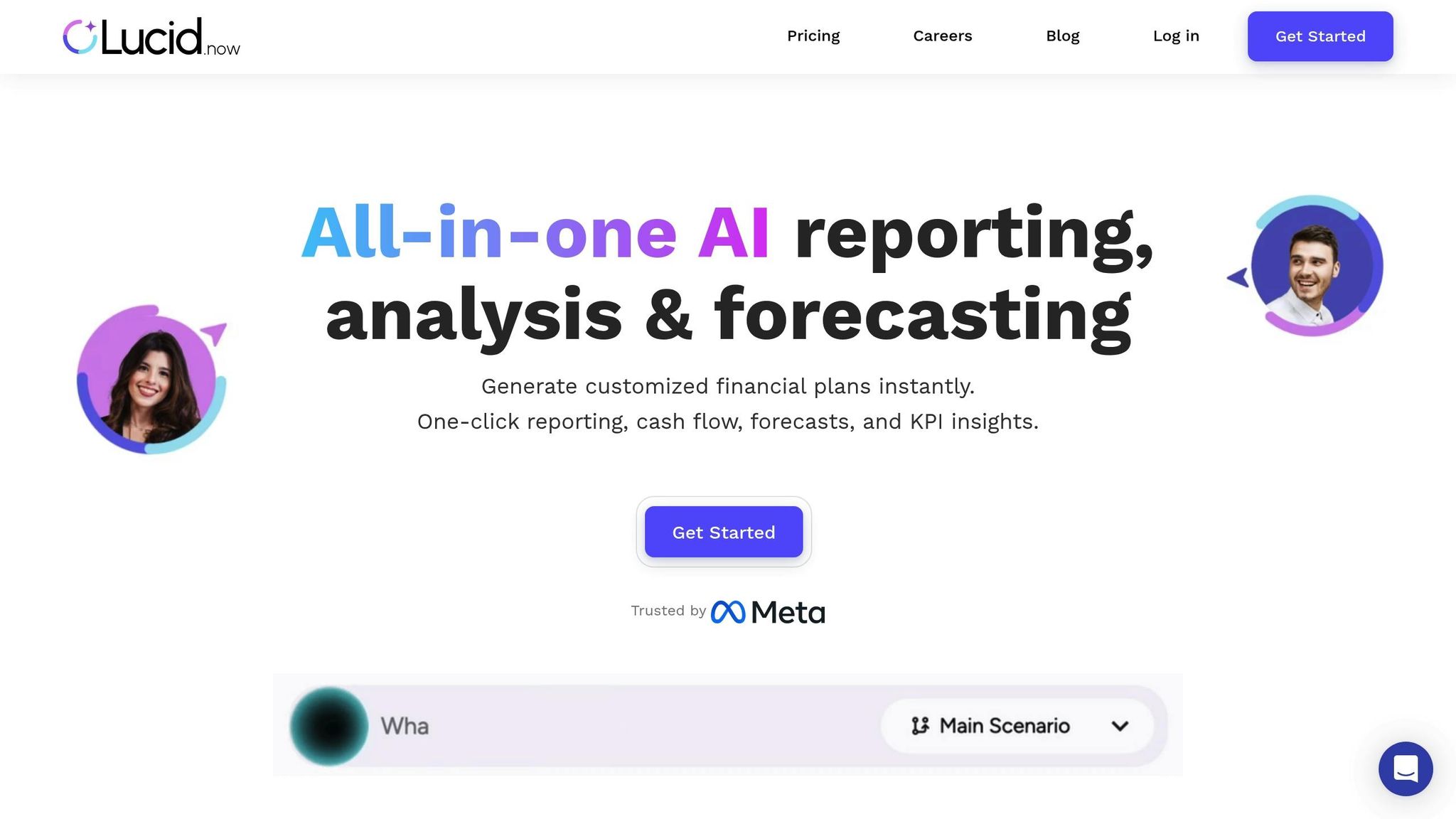Managing expenses can be tough for startups - manual tracking often leads to errors, missed tax deductions, and compliance issues. Natural Language Processing (NLP) changes the game by automating tasks like data entry, receipt processing, and compliance monitoring. Here's how NLP helps:
- Automated Data Entry: Extracts structured data from receipts and documents.
- Smart Categorization: Groups expenses into categories like travel, software, and marketing.
- Real-Time Validation: Flags errors, duplicates, and non-compliant expenses instantly.
- Mobile Tools: Log expenses via voice or photo, track spending on the go.
- Expense Insights: Analyzes patterns to improve budgeting and forecasting.
Tools like Lucid Financials integrate NLP with platforms like QuickBooks to provide seamless, real-time financial management. This means less manual work, better accuracy, and smarter planning for startups.
Want to know how NLP can transform your expense tracking? Read on for practical use cases and tips.
Automate Expense Tracking with AI | AI Agent with No Code
NLP Applications in Startup Expense Tracking
NLP is changing how startups manage expenses by automating data entry, extraction, and compliance tasks, making the process faster and more efficient.
Smart Expense Classification
NLP tools analyze transaction details and receipt text to automatically group expenses into categories like:
- Travel and accommodation
- Office supplies and equipment
- Software subscriptions
- Marketing expenses
- Client entertainment
"Lucid has made it incredibly easy to track spending, plan ahead, and handle our growth. It's straightforward and effective. Managing my finances has become much easier with this platform. It's user-friendly and efficient, saving me a lot of time and effort." - Aviv Farhi, Founder and CEO @Showcase
This automation also simplifies entry and data extraction processes.
Text-Based Expense Entry
Employees can log expenses in plain language, such as "Lunch meeting with client at Morton's - $125" or "Monthly Zoom subscription renewal - $149.90." NLP then extracts key details like:
- Expense categories
- Payment methods
- Project allocations
- Tax details
- Policy compliance
For narrative inputs, text-based entry works seamlessly. Meanwhile, automated receipt extraction takes care of pulling structured data from scanned receipts.
Receipt Data Extraction
By combining NLP with OCR, systems can pull crucial details from receipts, such as:
| Data Point | Extracted Data |
|---|---|
| Amount | $249.99 |
| Date | Apr 30, 2025 |
| Vendor | Office Depot |
| Category | Office Supplies |
| Tax Amount | $20.83 |
"We found a powerful yet simple solution for our financial planning needs, which has been a great addition to our business." - Refael Shamir, Founder and CEO @Letos
Expense Rule Monitoring
NLP also helps enforce rules by flagging overspending, identifying duplicate entries, detecting non-compliant expenses, spotting potential fraud, and ensuring tax compliance.
Adding NLP Tools to Startup Systems
Connecting with Financial Software
Integrating NLP tools with financial systems can simplify real-time expense tracking. For example, Lucid Financials connects directly to platforms like QuickBooks, payroll systems, and banking services. This integration ensures seamless data updates across all financial tools.
With AI-driven features, financial management becomes faster and more efficient by automating tasks such as:
- Synchronizing transaction data across platforms
- Matching expenses with bank statements
- Updating accounting records instantly
- Keeping detailed audit trails for compliance purposes
This setup also supports mobile-friendly financial solutions.
Mobile Expense Management
Expense tracking on the go is essential. NLP-powered mobile solutions let teams handle expenses quickly and efficiently. Key features include:
| Feature | Benefit |
|---|---|
| Voice Entry | Log expenses by speaking |
| Photo Capture | Process receipts instantly |
| Real-time Validation | Check compliance on the spot |
| Mobile Approvals | Speed up review and approvals |
These tools make it easy for employees to manage expenses anytime, anywhere.
Setting Up Company-Specific Rules
Tailoring NLP systems to your company's needs ensures accurate tracking and compliance. Using mobile tools as a foundation, businesses can create custom rules like:
| Rule Type | Examples |
|---|---|
| Spending Limits | Set department budgets or category caps |
| Approval Flows | Add multi-level reviews for big expenses |
| Category Tags | Create custom classifications |
| Policy Flags | Spot non-compliant spending |
The AI in these systems learns from your company's spending habits, automatically flagging unusual transactions or policy breaches. This reduces the need for manual checks and helps maintain better financial oversight.
sbb-itb-17e8ec9
Using NLP for Better Financial Data
Expense Forecasting
Natural Language Processing (NLP) transforms past expense data into forecasts that are both actionable and accurate. By analyzing structured and unstructured data, NLP helps create financial models that provide insights like:
| Analysis Type | Insights Provided |
|---|---|
| Seasonal Trends | Identifies recurring spending patterns |
| Growth Patterns | Estimates how expenses grow alongside the business |
| Category Evolution | Tracks changes in spending across categories |
| Budget Variances | Pinpoints areas where costs exceed projections |
These insights help businesses better understand their spending habits and plan for the future.
Expense Pattern Analysis
NLP digs deeper into expense descriptions, amounts, and timing to uncover hidden trends, such as:
- Category Relationships: Links between different types of expenses
- Vendor Dependencies: Heavy reliance on specific suppliers
- Spending Velocity: How quickly expenses are growing in certain areas
- Policy Compliance: Patterns of following or deviating from company policies
Lucid Financials leverages these insights to help startups cut unnecessary costs and find ways to consolidate spending. While recognizing patterns aids in long-term planning, real-time tracking ensures businesses stay aligned with their goals.
Live Expense Monitoring
Real-time monitoring builds on forecasts and pattern analysis to provide continuous expense updates. This is especially useful during:
- Growth Phases: Keep track of expenses as the business scales
- Fundraising Periods: Monitor burn rate and cash flow closely
- Strategic Initiatives: Ensure budgets stay on track with key objectives
Conclusion: Next Steps in NLP Expense Tracking
Startup leaders can enhance their financial strategies with AI-powered expense tracking, building on the practical applications of NLP discussed earlier.
Key Takeaways for Startup Leaders
NLP-based expense tracking is transforming how startups manage their finances. This technology delivers clear advantages in several critical areas:
| Area | Benefit |
|---|---|
| Efficiency | Speeds up financial management processes |
| Financial Planning | Allows quick scenario generation and comparisons |
| Cash Flow | Offers real-time insights into spending and runway |
| Compliance | Automates rule enforcement and ensures adherence to policies |
To maximize these benefits, startups should focus on implementing NLP tools that work seamlessly with their current financial systems. This ensures smooth data integration and accurate tracking for better forecasting and expense management.
These advantages position solutions like Lucid Financials as a smart choice for leveraging NLP in financial planning.
Features of Lucid Financials

Lucid Financials provides a range of NLP-powered tools tailored for managing startup expenses. Its AI-driven platform goes beyond basic tracking, offering deeper financial insights.
Some standout features include:
- Automated Expense Classification: Automatically categorizes transactions using natural language processing.
- Real-time Financial Planning: Quickly generates financial models and forecasts.
- Integration: Connects directly with tools like QuickBooks, payroll systems, and banking platforms.
For startups aiming to streamline their expense tracking, Lucid Financials also offers bookkeeping, tax, and FP&A services for $350.
FAQs
How can NLP improve expense tracking accuracy and streamline workflows for startups?
Natural Language Processing (NLP) can revolutionize expense tracking for startups by automating manual tasks and offering deeper financial insights. For example, NLP can process receipts, invoices, and financial documents in real-time, extracting key information like amounts, dates, and vendors with high accuracy. This reduces human error and saves valuable time.
Additionally, NLP-powered systems can categorize expenses automatically, identify spending patterns, and provide actionable insights. These capabilities help startups make informed financial decisions and optimize their workflows, enabling them to focus more on growth and less on administrative tasks.
What are the main advantages of using NLP tools with financial software like QuickBooks for startups?
Integrating NLP tools with financial software such as QuickBooks provides startups with several key benefits. It helps automate routine tasks like expense categorization, invoice processing, and generating financial summaries, saving valuable time and reducing manual errors.
Additionally, NLP enhances the user experience by enabling natural language queries, allowing users to ask questions like "What were my total expenses last month?" and receive instant, accurate insights. This makes financial management more intuitive and accessible for teams with limited accounting expertise.
For startups, these tools can also uncover trends and patterns in spending, offering actionable insights to optimize budgets and improve financial planning. Overall, NLP integration streamlines workflows and empowers startups to make smarter financial decisions with ease.
How can startups tailor NLP systems to meet their financial policies and compliance requirements?
Startups can customize NLP systems by training them on their specific financial data and policies. This involves using annotated datasets that reflect the company's unique compliance standards, such as tax regulations, expense categories, and approval workflows.
Additionally, startups can implement rule-based models alongside machine learning to ensure the system adheres to strict compliance needs. Regular audits and updates to the NLP model are also essential to keep it aligned with evolving policies and regulatory changes. By doing so, startups can ensure their expense tracking systems remain accurate and compliant with financial requirements.


